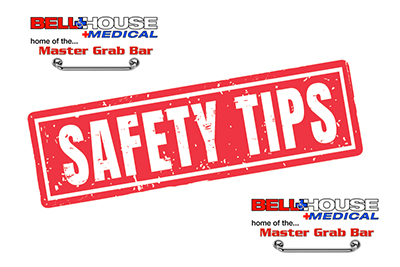Stay-at-Home Safety Tips for Seniors
Thu, Dec 17th, 2020
Did you know, nearly 3 million older adults are taken to the emergency room because of an accidental fall? With older adults being the most susceptible to COVID-19, avoiding hospitals and emergency rooms could literally be a life-saver. It's important to make changes around the home to ensure you are safe. If you are unable to make these changes, have a family member who has been careful during COVID-19 come over and do them for you. Some of the enhancements around your home require a professionals touch.
In this blog, we'll discuss some high-risk areas in your home that might need to be adapted for you to live in a senior-friendly environment!
Stairs
Although stairs aren't the most frequent place in a home where senior citizens fall, they are the most dangerous. Falling on a flat surface can result in injury, but falling down a flight of stairs is absolutely devastating for older adults. To make your stairs safer:
- Be sure lighting on the stairway is well lit. Replace bulbs as needed.
- If you feel shaky or weak walking up or down stairs, invest in a stairlift.
- If you don't have anything to grab onto while walking on the stairs, have railings installed.
- Make sure uncarpeted stairs have a rubber tread or something to help you gain traction as you go up and down them.
Living Areas
This is where you spend the most time. Make sure everything is organized and in its place. Failing to do so can result in you tripping over something that you didn't know was there. To keep your living area hazard-free:
- Arrange furniture with a clear pathway to reduce the risk of falling over a chair, sofa or table.
- Having a lift chair will make it easier to sit and stand without assistance, reducing the risk of falling.
- Remove throw rugs, or secure them with nonslip backing.
- Make sure doorways are wide enough to accommodate a walker or wheelchair.
Bedrooms
It's important to keep things in your bedroom easily accessible so you can start each day off on the right foot. If there is an emergency, it's important to have things out and ready to take action. To do this:
- Keep a phone and emergency alert device at your bedside throughout the night.
- To make your morning routine easier, keep sock aids, reacher/s, leg lifter/s or any orthopedic products by your bedside.
- Install a nightlight that turns on and off automatically so you don't have to walk in the dark to turn on a light.
Bathrooms
Did you know about 80% of senior citizen falls that result in hospital visits occur in the bathroom? To make this space safer:
- Install grab bars in high-risk areas of your bathroom.
- Put a nonslip rubber mat in your tub or shower.
- A raised toilet seat will make using the bathroom much easier and safer.
- Have a zero-threshold shower installed so you don't have to step over an entry.
- Shower seats, used in conjunction with a hand-held showerhead, will allow you to stay seated. Standing while twisting and turning to bathe yourself can cause you to lose your balance and fall.
Kitchen
When it comes to home safety, the kitchen is oftentimes overlooked. But if you're not careful, the kitchen will present a few dangerous hazards. To avoid them:
- Clean up spills immediately. The longer you wait, the odds of forgetting about them increases.
- Keep things you use daily on a lower shelf.
- Do NOT stand on a chair to reach an item on an upper shelf.
- Buy a reacher for things that are out of your reach.
Bell House Medical
Many of these tasks can be completed by you or a capable loved one. But for things that are a little more challenging to install or fix, contact Bell House Medical. We're in the business of making your life easier and safer. The holiday season is here and we want everyone to remain healthy, happy and safe.
Merry Christmas!
(302) 644-4404






